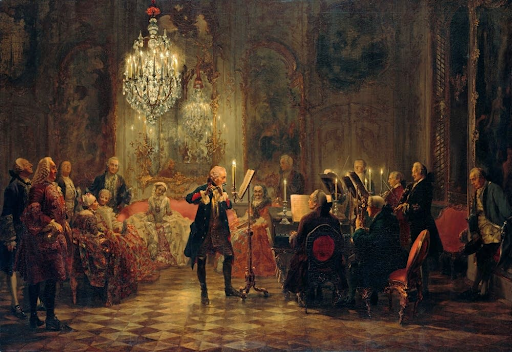Why Has Classical Music Lost Popularity?

November 5, 2022
Classical music is not nearly as popular in our society as it used to be. There is no doubt about it. While there are some new popular classical artists, looking at Spotify numbers (the second most popular music streaming platform), there are very, very, few that can even get above a million listeners. Of course having a million listeners is nothing to undermine and many artists struggle to get even one percent of that, but compared to the most popular artists of the most popular genres, Beethoven’s 5 million listeners does not compare to Ed Sheeran’s 78 million listeners. So why is it dying? And why have the most popular classical music writers been the same for over 300 years?
The first thing I want to make clear is that while classical music is dying, its possibility for creativity and innovation has not hit a wall. Classical was one of the first music genres written in the modern music language, evident by the name. The basic theory behind its music follows a lot of strict rules with one of the most well-known being that a song starts and ends on the tonic note of the scale used in the song. In other words, a song on an E major scale starts and ends on an E note. Classical music serves as the basis for other genres that pick and choose the rules they want to keep and break, but despite this being the case, don’t think that this means classical is more limiting than any other genre. When a genre breaks a rule of classical, the breaking of that rule almost becomes its rule. Just because genres have rules doesn’t mean that a genre can’t break those rules while still being within that genre. More importantly, it doesn’t mean that staying within those rules creates a boring stream of pieces that all sound the same. For example, The Beatles are mainly considered a rock band but a lot of their most popular songs like “A Day in The Life,” “Blackbird,” and “Penny Lane” are classical songs that break some rules with rock elements. Staying within most of the rules, “Moonlight Sonata” and “Symphony No. 5 in C minor, Op. 67” (the one with the famous 4-note phrase) sound nothing alike. The issue is not a lack of directions to go in the genre, but mainly its prestige.
The common stigma around classical music is that it’s very prestigious, and to be fair, it most certainly is. Classical music would be played for royalty, aristocrats, and upper-middle-class Europeans when it was most prominent. While you might go to a rock concert in your jeans, you would get looks if you wear casual clothing to the Philadelphia orchestra. One of the reasons rap, hip-hop, country, and metal are successful is because of their ability to relate to the emotions, experiences, joys, and struggles of a broad group of people. Classical, in my opinion, struggles to do this. For starters, Bach is OLD, like REALLY OLD. This doesn’t help his music or many of the other older classical artists relate to younger people in the modern day. On top of that, Bach and many classical artists were, even then, very unique and different from their peers. Whether they were unusually violent and brutal, or openly depressed and prone to mood swings, they didn’t fit in with their “normal” peers. The tortured 1800 artist expressing their complicated and active brains through a series of intense and calm, fast and slow, disturbing and comforting chord progressions that can have multiple interpretations, has a harder time being understood by a group of people than Johnny Cash telling people that doing something bad and going to prison sucks. Of course, part of the appeal of classical music is to figure out what the person who wrote it was trying to say, but that appeal isn’t a straightforward, wide appeal.
Not only is classical music prestigious to the public, but possibly even more so to the people that make it. As stated previously, classical music has a lot of strict rules, and following them is hard as there are a lot of parts to write with those rules. Parts of music are different, as the name suggests, parts of the song are performed by different instruments in the composition. For example, the basic parts of a rock band are drums for the beat, piano/bass for rhythm and chords, and guitar/vocals for melody and harmony. On the other hand, Beethoven’s 5th symphony has 1 piccolo, 2 flutes, 2 oboes, 2 B-flat clarinets, 2 bassoons, 1 contrabassoon, 2 E-flat horns, 2 C-horns, 2 C-trumpets, 1 alto trombone, 1 tenor trombone, 1 bass trombone, 1 timpani, and multiple first and second violins, violas, cellos, and double basses throughout the symphony. THAT’S 18 PARTS. You can definitely write classical music with far fewer parts. Most of Chopin’s works are solo piano, but writing symphonies like Bach, Beethoven, and Mozart is no easy task. Some of the prestige and elitism in classical music have made some hesitant to move to more modern music notation software that makes writing music much easier.
Not only is classical music a herculean task to write, but also to produce and perform. The expectation is that classical music is played with traditional classical instruments which already leaves out the many electric guitar, bass, pianos, and drum set musicians in the world. Playing classical music is also a different beast from almost every other popular genre. As a saxophone player, I can play rock, pop, RnB, and jazz all semi-similarly, with a rhythm slightly different than some, or being a little out of key on a few notes. Playing classical almost feels like I’m playing a different instrument, and the way you have to play it is like many aspects of the genre; clean, exact, and pitch perfect. You have to learn saxophone and then you have to learn classical saxophone, and on top of the fact that many of these pieces can be incredibly difficult and require hours upon hours of practice, it makes finding people that are able to and willing to play classical music a challenge and expensive.
A lot of aspects of classical music are, no doubt, prestigious and cumbersome. This has made it hard for people to relate to the mostly lyric-less genre and to write in the etiquette of its language. Not only that, but it’s a major sacrifice of time and money to produce it all. Writers and producers of other genres have been using new technology, creative instrumentation, and smart choices that have made their music easier to make without sacrificing their interesting beats and invigorating melodies, but it seems the classical genre has failed to move on. I think the way you can bring it back into the limelight is just like how The Beatles did it in the 60s and 70s. You can combine the classical feel and some of the instrumentation with the groove, instruments, and effects that the modern era of music has brought, allowing for some awe-inspiring compositions. Just because it’s not a widely appealing genre today doesn’t mean you shouldn’t listen to it either. What makes it so hard to make and complicated to understand is part of what makes it so interesting to listen to, and if you want to produce music yourself, there are thousands of lessons you can learn from classical music even if the music you are making is of another genre.

